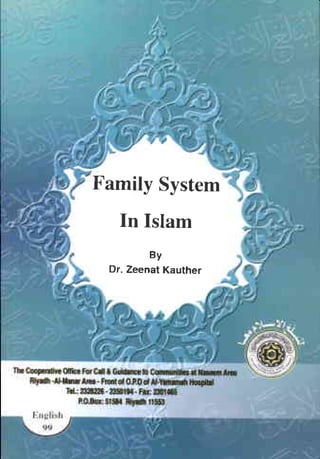General Objectives
a .On successful completion of this course, the students will be able:
-
- To have awareness about the fundamentals of family life
- To identify the factors (psychological, social, and emotional) which destabilize family life
- To understand and be able to apply teaching of the Qur’an and Sunnah in their life
- To bring behavioral change as per Islamic teachings in family life and develop a balanced personality
- To develop skills needed for home management and conflict resolution
b.Specific Objectives
- Knowledge
- To understand purpose of family life from Islamic perspective
- To compare and contrast the foundations of family life in Islam and other cultures
- To recognize psychological, social and emotional factors that may destabilize family life
- To understand reasons for variance in issues like divorce, inheritance, child custody, personal freedom and their Islamic resolutions
- To learn the Qur’anic and sunnah approach in building responsible, caring, benevolent and fair Islamic social orders
- Skills
- Learn to deal with situations in everyday family life
- To build capacity of home management and conflict resolution
-
Attitude/ Behaviour
- To enhance a positive approach of rahmah, ta’awun in good and submission ‘ubudiyah, to Allah s.w.t. in family life
- To develop a balanced and fair personality, observant of its responsibilities toward society and state

 Family system in islam
by
Family system in islam
by